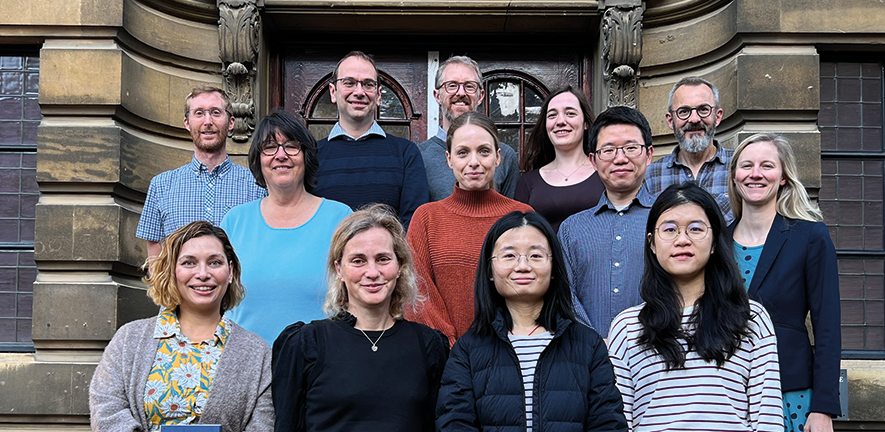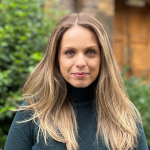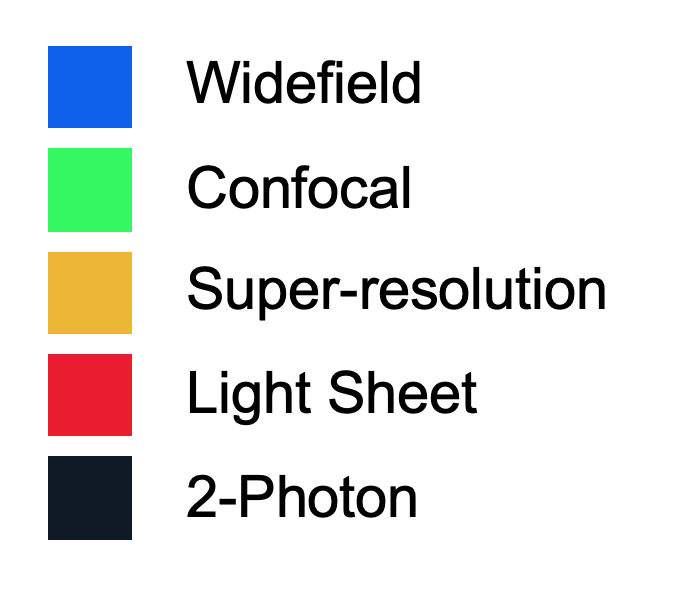
The Microscopy Bioscience Platform provides cutting-edge microscopy resources in the School of Biological Sciences. Our team provide comprehensive support for the entire microscopy workflow, including helping design your experiment, train you in using microscopes, assisting you in developing new techniques if they are required and, where we have expertise, helping to interpret your images.
The platform is based across seven Departments in the School (Biochemistry, Genetics, Pathology, Zoology, Pharmacology, Psychology and Physiology, Development and Neuroscience) and we also maintain strong links with other microscopy units in the School. We are open to users from other Schools within the University of Cambridge, external academics and industry.
The Microscopy Bioscience Platform is supported by five core pillars:
Our platform aims to foster innovation and collaboration, offering researchers access to state-of-the-art technologies and expertise. Whether you are working with light microscopy, electron microscopy, or exploring new horizons in image analysis, our team is here to guide you.
At the heart of our mission is the commitment to advancing biological sciences through the integration of technology and research. We operate a formal 'Fair Attribution Policy' recognising that Research Technical Professionals are scientists that provide invaluable contributions to your research. Expectations around this area will be discussed at an early stage in your interactions with us and will be reviewed throughout each project.
Microscopy Bioscience Platform Team
The Microscopy Bioscience Platform Team
Left to right, front row: Dr Filomena Gallo, Dr Leila Muresan, Boya Zhang and Xiaoyu Deng.
Second row: Dr Karin Muller, Dr Lisa-Maria Needham, Dr Chengxi (Todd) Zhu, Dr Antonina Kruppa.
Third row: Dr Jon Howe, Dr Martin Lenz, Dr Ben Sutcliffe, Georgina Lindop and Dr Matt Wayland.
Dr Lisa-Maria Needham
Director of the Microscopy Bioscience Platform
lmed2 [at] cam [dot] ac [dot] uk
Lisa-Maria Needham is the Director of Microscopy Bioscience Platform. She was previously a Marie Skłodowska-Curie Postdoctoral Fellow at the University of Cambridge and the University of Wisconsin-Madison (USA).
She is an expert in novel technology that allows ultra-sensitive, label-free measurements of single biomolecules in the solution-phase and has also designed and applied novel fluorophores for single-molecule fluorescence and super-resolution imaging. As Director of the Microscopy Bioscience Platform, she contributes to broad experimental problem solving, research and technology development and wider management of the Platform and its strategic direction alongside the School's Strategic Microscopy Board.
Location
The Platform is located within the School of Biological Sciences, based on the Downing and New Museum sites. Instruments are located across six departments.
Frequently Asked Questions (FAQ)
How do I request training?
We use Stratocore Pasteur Platform Management System (PPMS) to manage equipment bookings and training.
As a new microscopy user, we ask that you:
-
create a PPMS account with your CRSid (if you have one).
-
create a project. You are required to enter the grant code in the “account number” box. Account number format: XXXX/### e.g. ABCD/123.
-
select “request a training” on the PPMS homepage and complete either the Light Microscopy Training Request form or the Electron Microscopy Training Request form.
Do I need a sample before being trained on a microscope?
You must have a sample ready to image before being trained on the microscope. This prevents loss of skills between training and the time required to prepare a new sample and allows you to trouble shoot your imaging with expert support on a relevant specimen during the training session.
What should I do if I need to cancel or reschedule my booking?
Late cancellations will be charged if no reasons are given. If you are unwell or cannot attend due to other extenuating circumstances, please let us know, and we can remove associated charges with your booking.
How do I cost the facility use in my grant application?
You should first get in contact with the appropriate Microscopy Platform team (see relevant pillars to find contact information) to discuss your project plan and budget outline. It’s important that you budget sufficiently for your needs and include costs to support data analysis and data management if required. The team will be able to help you with this.
Can I use the facility if I’m currently without funding?
We are aware that certain communities have limited access to the budgets required to access platforms and facilities and are always prepared to try and overcome these barriers. Please contact us if you are in this position.
How are the facility prices decided?
The cost of services and collaborations is initially calculated on a full price model that includes facility staffing, equipment service contracts and replacement, consumables and departmental overheads. Pricing reflects these costs but is also sometimes determined by specific rules imposed by funding bodies. We review our prices annually and benchmark them against both internal and external providers of similar services and reserve the right to change costs from year to year as part of our commitment to running the platform sustainably.
Fair Attribution Policy
Research Technical Professional (RTP) are scientists working in Platforms and Facilities who support and provide invaluable contributions to research. It is vital that we fairly recognise these contributions to empower individuals, support their career progression and the long-term sustainability of facilities in enabling successful research applications.
Formal Fair Attribution Policies are currently being developed in the University and we ascribe to the Royal Microscopy Society guidelines for fair attribution.
Acknowledgement in academic publications should be given routinely in all scenarios where services and collaborations progress beyond the fist initial discussion with the Director of Facility Lead.
The standard text for this acknowledgement is:
‘The authors gratefully acknowledge the Cambridge Microscopy Bioscience Platform for their support and assistance in this work’.
At our initial meeting with you, we will also provide any specific grant numbers relating to microscopes used in the studies and may also contact you with additional information where appropriate.
Authorship should be given when significant intellectual contribution has been provided by the Research Technical Professionals. We understand that this can be challenging to define and is also in some cases a decision made a long time after the science is carried out, so we will discuss this at the initial meeting with you to ensure both parties are in agreement. If you are a doctoral student, we may also contact your Group Leader to ensure that they also agree to the approach and guidelines. Where authorship is required, we expect to be consulted throughout the publication process to ensure that presentation of results follow our own internal guidelines for quality assurance and reporting.
Examples of where authorship is appropriate are provided within the Royal Microscopy Society guidelines.








